Ikigami
The last couple days, I've been reading Naoki Urusawa's early work from the Nineties, Master Keaton, and honestly: it's been a bit of a struggle. The book's fine and well done. The characters, engaging. The plots, exciting. The art, nice and Urusawa-ish. Technically, there's nothing really wrong with anything I've read so far. The issue is personal, a matter of tastes. I have a problem and it's such a triviality that to name it a problem is to do a disservice to all the real and actual problems out there. The trouble is that I'm a serial man and have real difficulty maintaining interest in episodic content.
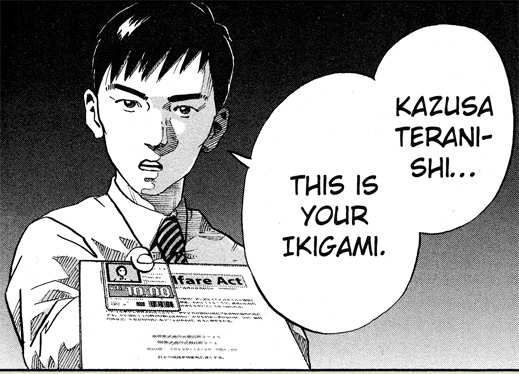
And Master Keaton is very episodic. I'm a book and a half in and I've yet to detect anything resembling a plot for the series (unless you consider the occasional cameo of Keaton's interest in getting back together with his ex-wife). Master Keaton plays rather like an anthology of Keaton stories. It's like an Alfred Hitchcock Presents of stories about Hiraga Keaton and how he'll get out of this scrape or solve this case. They're all great on their own. I just have a hard time staying motivated to develop an interest in the next case.11Honestly, I feel a bit similarly with Monster. Even though there's a definite trajectory to that book, it's pretty similar to X-Files in that there's an over-arching story providing a framework onto which to hang all these unrelated story vignettes. It's kind of like the Voyage of the Dawn Treader, which I loved as a kid but would probably not have the patience for today. I had the same trouble with Wolfsmund (until it really got cracking) and with the sublime anime Mushi-shi. I just happen to require a grand story to drive my interest in longer works.
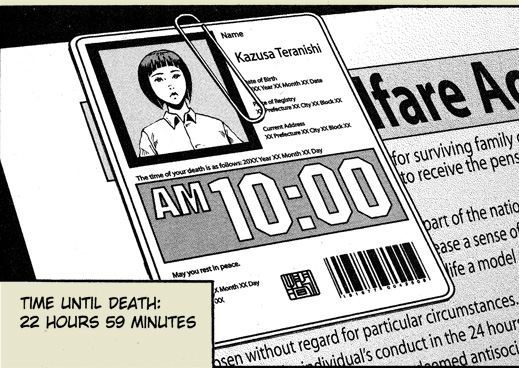
Ikigami takes a long time for its real story to unfold. At 10 volumes, we have to wait pretty much 'til volume 10 for the story to find its legs. Sure, there're hints scattered throughout, but even into the tenth volume the book maintains its formula. Which is great if you're on board but was a struggle for me.
For formula, Ikigami divides each volume into two discrete arcs that rarely inform the story to come in any meaningful way. At some point in each arc, two things happen:
- Fujimoto, a civil servant agent of Ministry Of Health And Welfare (as sinister as it sounds), delivers an Ikigami death notice to an individual alerting them that they have twenty-four hours to live.
- At some point, twenty-four hours or less later, the person who received the Ikigami dies.
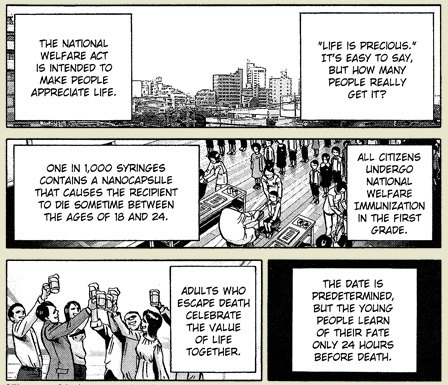
The drama is all wrapped up in the question How will this individual living in their own particular context and circumstances react to the news of their imminent demise. And it's usually pretty well done. There's an undercurrent of dissatisfaction with the government's system and the repression of that dissatisfaction that runs throughout and gives a hint at the developing narrative, but it takes a looooong time to get there.
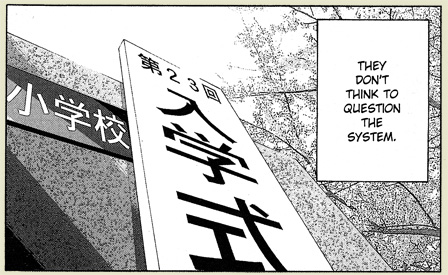 Anti-vaxxers are giving Viz huge backrubs for publishing this
Anti-vaxxers are giving Viz huge backrubs for publishing this
Okay, so obviously this is some sort of dystopian or alt-history take on the way the world works. Nationally, children receive mandatory vaccinations at age six. The vaccines are said to vanquish basically every major virus. The other shoe: 1 out of every 1000 vaccinations contains a nano-chip that will burst somewhere between the inoculated's 18th and 24th birthdays, killing them. This is how a government office can predict when individuals will expire within a twenty-four-hour window. Ostensibly, the reason for what seems a ridiculous measure is that the sacrifice of a relative few will increase the joie de vivre in the survivors, causing them to cherish the gift of breath and go on to be prosperous cogs in the societal machine.
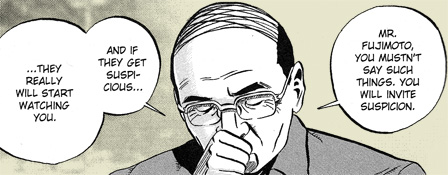
It's a stupid explanation—on an order not unlike the rationale behind the death arena of Battle Royale—but the people seem to buy it. (And I know enough of actual history to know that people, when taken together, are a bit of a collective moron. Hitler and the Cultural Revolution and every war ever, anybody?) There is an alternative explanation that's revealed as canonical late in the series, but it's honestly only marginally better. It was hard to maintain suspension of my mounting disbelief, but the two-per-volume vignettes were pretty engaging, so I was able to forgive much (though not all).
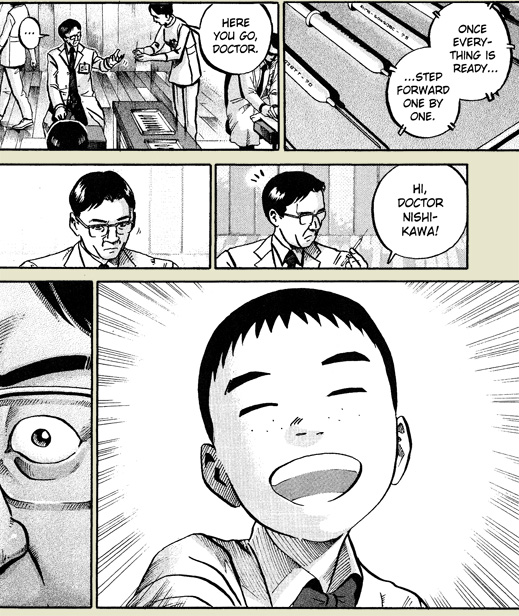
It's a fine enough series, though maybe four volumes longer than I (and my weakness) would have preferred. It's probably right up the alley for the YA dystopian crowd. Fascist government, ridiculously barbaric law, people gradually coming to see the light, a growing insurgency, and a couple decent twists. It's Hunger Games with more pictures, less bloodshed, and no female archers. And the protagonist is like twenty-five years old, so maybe too old, I don't know. I borrowed the entire series from the library, which was great. I don't think I would have been happy to have paid full price for the whole series.
Good Ok Bad features reviews of comics, graphic novels, manga, et cetera using a rare and auspicious three-star rating system. Point systems are notoriously fiddly, so here it's been pared down to three simple possibilities:
3 Stars = Good
2 Stars = Ok
1 Star = Bad
I am Seth T. Hahne and these are my reviews.
Browse Reviews By
Other Features
- Best Books of the Year:
- Top 50 of 2024
- Top 50 of 2023
- Top 100 of 2020-22
- Top 75 of 2019
- Top 50 of 2018
- Top 75 of 2017
- Top 75 of 2016
- Top 75 of 2015
- Top 75 of 2014
- Top 35 of 2013
- Top 25 of 2012
- Top 10 of 2011
- Popular Sections:
- All-Time Top 500
- All the Boardgames I've Played
- All the Anime Series I've Seen
- All the Animated Films I've Seen
- Top 75 by Female Creators
- Kids Recommendations
- What I Read: A Reading Log
- Other Features:
- Bookclub Study Guides











